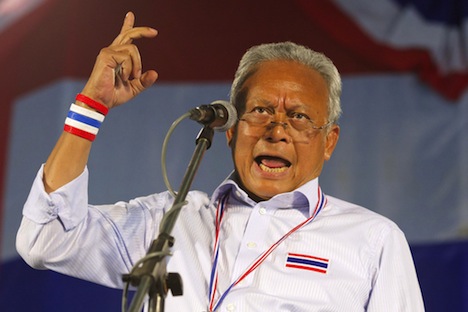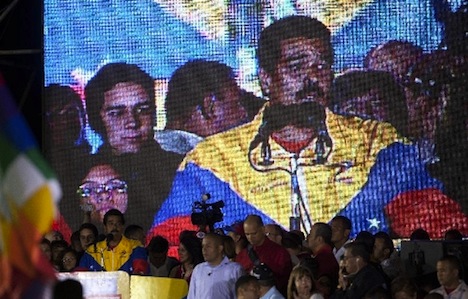With the February 2 general election approaching, Thailand’s opposition has decided that it won’t contest the vote and will instead boycott the elections — a strategy that seems like a bet that the Thai military will intervene on its behalf against current prime minister prime minister Yingluck Shinawatra.![]()
You might assume that an opposition party that boycotts an election is automatically sympathetic — that it’s doing so because the polls will be so rigged against it that it can make a bolder statement by avoiding the polls altogether. But it’s never really quite that simple. In the most recent 2011 general elections, Yingluck’s party, the Pheu Thai Party (PTP, ‘For Thais’ Party, พรรคเพื่อไทย) won an overwhelming victory with 48.41% of the vote and 265 seats in the Thai House of Representatives, the 500-member Ratthasapha (National Assembly of Thailand, รัฐสภา), the lower house of Thailand’s parliament. By contrast, the opposition Phak Prachathipat (Democrat Party, พรรคประชาธิปัตย์) won just 35.15% and 173 seats.
An aborted attempt by Yingluck’s government to introduce an amnesty bill earlier this autumn backfired severely, leading to protests against her government that have threatened to exacerbate the long-simmering tension between the ‘red shirts’ who support Yingluck and her brother, the self-exiled former prime minister Thaksin Shinawatra, and the ‘yellow shirts’ who oppose them.
Yingluck’s response was to call early elections in February. But top Democrat leader Suthep Thaugsuban, himself a former deputy prime minister, has demanded that Yingluck also resign as prime minister, a step that Yingluck has refused to do, and earlier this week, Suthep announced that the Democrats would boycott the vote:
“Thai politics is at a failed stage,” party leader Abhisit Vejjajiva, a former prime minister, told reporters in announcing the decision not to run. “The Thai people have lost their faith in the democratic system.”
If Thai politics is at a failed stage, though, it’s as much the fault of the Democrats as anyone else. They might not like the politics of Thaksin and Yingluck, which have involved massive handouts to the poorest Thais to improve health care and social welfare. Some of those handouts, most notably rice subsidies, have backfired in ways that hurt the economy in Thailand, which is a top global exporter of rice. But it’s more honest to say that the Thai people have lost their faith more in the Democrat Party than in the democratic system.
Suthep’s gambit is more a cynical ploy than a legitimate grievance about the election’s fairness. The Democrats have done nothing since 2011 to expand their appeal to voters outside their stronghold in Bangkok and southern Thailand. The success of Thaksin and Yingluck lie largely in their hold over voters in the largely rural Thai heartland in the north and in Isan, Thailand’s discrete northeastern region. That’s one of the reasons that Suthep and the yellow shirts are so insistent that Yingluck be removed from Thai politics — her appeal to northern Thais is so great that the Democrats haven’t been able to break the lock that she and her brother have over northern voters. By calling elections, Yingluck invited Suthep and the Democrats to unseat her at the ballot through politics, not mob rule. By boycotting those elections, Suthep is admitting that the Democrats don’t have the tools to win an election in Thailand.
It’s even more cynical in that the boycott is essentially a plea to the Thai military for assistance. The last time that the Democrats boycotted the vote in the 2006 general elections, Thailand’s monarch and the constitutional court declared the results unconstitutional, which only depended fighting between Thailand’s two largest parties and led to a military-led coup to reintroduce order. But Thaksin’s allies ultimately won the 2007 elections that the military transitional government intro conducted, just like Yingluck won the 2011 elections after a period of military-backed rule under Democrat Party leader Abhisit Vejjajiva from 2008 to 2011.
So what’s the end game? A military intervention in 2014 that postpones Yingluck’s electoral victory until 2015?
While the military has never been particularly enamored of Thaksin and Yingluck, there are a lot of good reasons why the military might not come to the Democrat Party’s rescue a third time in eight years. Continue reading Thailand’s Democrats boycott election in cynical ploy

